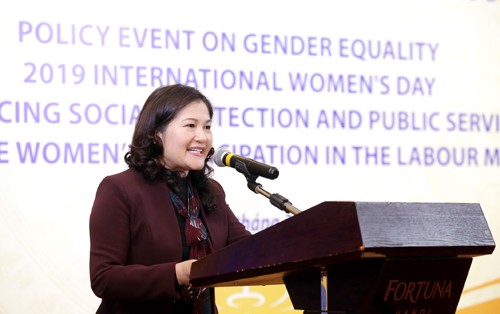 Deputy Minister of Labor, Invalids, and Social Affairs Nguyen Thi Ha addresses a policy event on gender equality (Photo: molisa.gov.vn) Deputy Minister of Labor, Invalids, and Social Affairs Nguyen Thi Ha addresses a policy event on gender equality (Photo: molisa.gov.vn) |
Gender equality means men and women have equivalent positions, roles, and opportunities to capitalize on their abilities for community and family development and equally enjoy the fruits of development. Vietnam’s achievements in narrowing the gender gap have won international praise.
Recognized progress
The Vietnamese Party and State have focused on improving laws and policies to enable women to assure a larger part in public life. The 2006 Law on Gender Equality and the National Strategy on Gender Equality for the 2011-2020 period have made a difference.
The Party Central Committee’s Resolution on social policies from 2012 to 2020 stipulates that Vietnam’s social welfare network will cover all people by 2020 to ensure human rights, including the rights of women and girls. Every year, the government allocates 2.6% of national GDP to social assistance programs. Deputy Minister of Labor, Invalids, and Social Affairs Nguyen Thi Ha said: “Thanks to its own efforts and determination plus support from international organizations and communities, Vietnam continues to be one of the countries seeing major progress in gender equality and early completion of the Millennium Development Goals on gender equality and women’s empowerment. In 2018, Vietnam ranked 6th of 57 surveyed countries in the percentage of female owners of businesses (31.3%). Vietnam is the only Asian country in the Top10 countries with for rates of female participation in the economy. Vietnam is one of 10 countries which have successfully realized the 5th goal of the UN for gender equality and empowerment of women and girls.”
Continued adjustment of welfare policy for gender equality
In the 4th Industrial Revolution, Vietnam is required to do more to increase productivity and create decent jobs, a goal that involves women and girls. Deputy Minister Ha said: “Two important goals of social welfare are promoting sustainable employment and developing the labor market. Creating job opportunities and high, stable income through vocational training, loans to job generators, access to the labor market, and improved public services for female workers are solutions to poverty reduction and sustainable employment.”
The revision of the existing Labor Code will be submitted to the National Assembly in May. It seeks to replace the approach of “protecting female workers” with “promoting gender equality”, enabling Vietnam to lead the region in respecting basic rights in labor, a foundation for increased productivity and competitiveness.